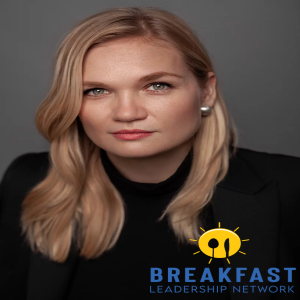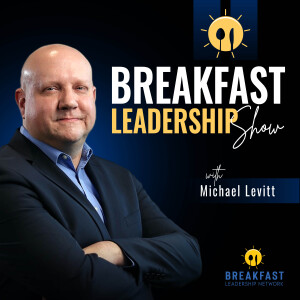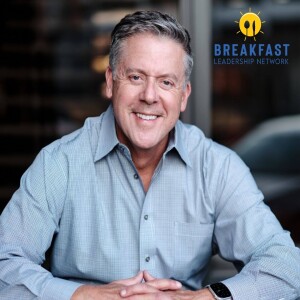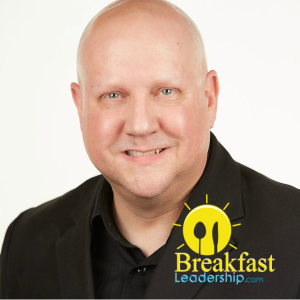Breakfast Leadership Show
Episodes

Thursday Apr 17, 2025
Thursday Apr 17, 2025
Show Notes:
In this insightful conversation, I’m joined by executive coach and cross-cultural advisor Olga, who works closely with tech leaders and entrepreneurs navigating high-pressure environments. Together, we unpack the intense demands of the tech industry—where innovation races ahead at lightning speed, but personal well-being often gets left behind. Olga highlights the unique tension of building groundbreaking technologies while maintaining a healthy life outside of work. I chimed in with what I see far too often: burnout is rampant in the tech sector, and without prioritizing self-care, decision-making—and company longevity—suffers.
We also dove deep into the entrepreneurial journey. Olga and I explored the emotional and psychological toll founders face—especially around identity, self-worth, and navigating interpersonal conflict within founding teams. It's not just about scaling a business; it's about sustaining the human behind it. Effective communication, conflict resolution, and staying grounded during turbulent times are non-negotiables for any founder.
The conversation turned toward a recurring theme in my work: leadership. I shared my concerns about poor leadership styles that, despite producing short-term success, damage team morale and engagement. When top talent walks out the door due to burnout or toxic management, entire industries suffer. Strong, people-first leadership isn’t optional—it’s foundational to innovation and impact.
Finally, we discussed the importance of addressing the real issues holding teams and organizations back. Growth doesn’t come from ignoring problems; it comes from facing them head-on with clarity and humility. Olga shared her coaching philosophy, focused on healing systems by identifying and amplifying what is working, and slowly transforming the rest.
This episode is a must-listen for tech leaders, founders, and anyone navigating leadership in high-pressure spaces. Be sure to connect with Olga to learn more about her transformative coaching work.
About
As a former CEO, startup executive, and investor, I’ve navigated every stage of company growth— from inception to IPO— as both a founder, business owner, and corporate executive. Early in my career, I achieved “success” and became well-known, gaining a deep understanding of the rapid and often unstructured journey of building a business.Today, I coach and advise startup CEOs, serial founders, and ambitious tech leaders who are navigating high complexity and uncertainty. I’ve mentored, advised, and coached over 200 CEOs and their teams through various stages of transformation and growth, including even pandemics, wars, and natural disasters. My mission is to help leaders walk this path consciously with a bigger life vision in mind.The benefit of working with me is having someone by your side who has seen the entire journey multiple times. Whether you're starting from scratch or scaling an established company, I can help guide you toward a successful and sustainable future.🔹 Specialized Areas- CEO Coaching - Executive and Transition Coaching- Global Strategy, Innovation, and Entrepreneurship- Tech Leaders Transition🔹 Fun Facts- 🌐 Multilingual: I live, think, and feel in three languages: English, German, and Russian.- ✈️ Global Citizen: I am a serial foreigner, calling Berlin, Vienna, San Francisco, Singapore, New York, and Zurich home.- 💻 Tech Enthusiast: With a background in mobile hardware and software, I have a strong passion for technology and innovation and a knack for fixing my husband’s computer.- 💡 Advocate: Diagnosed with ADHD at a young age, I know how it feels to be different and "not enough." I've learned to love myself despite it and achieve from a place of self-acceptance.
LinkedIn: https://www.linkedin.com/in/olgaskipperexecutivecoaching/
Website: https://olgaskipper.com/

Thursday Mar 27, 2025
Sleepmaxxing – The Secret to Beating Burnout & Unlocking Peak Performance
Thursday Mar 27, 2025
Thursday Mar 27, 2025
Episode Summary:In today’s fast-paced world, burnout is a growing epidemic. But what if the secret to higher energy, sharper focus, and sustainable success isn’t working harder—but sleeping smarter? Enter sleepmaxxing, a game-changing approach to optimizing rest for peak recovery, clarity, and mental well-being.
In this episode, we dive into:✅ How sleepmaxxing prevents burnout and boosts resilience.✅ The science behind high-quality sleep and cognitive performance.✅ Proven strategies to improve sleep and enhance mental clarity.✅ The ripple effect: How better sleep transforms productivity and leadership.
If you’re a high achiever struggling with stress, decision fatigue, or exhaustion, this episode is a must-listen!
🔔 Subscribe & Share with fellow professionals who need this life-changing sleep strategy!
💡 Key Takeaways:✔️ Burnout Prevention – Sleep restores energy, reduces stress, and regulates emotions.✔️ Peak Mental Clarity – Sleep enhances focus, memory, and problem-solving.✔️ Maximizing Recovery – Sleepmaxxing optimizes rest to fuel sustainable success.
📢 Resources & Links:🛏️ Top Sleep-Enhancing Tools & Trackers📘 Recommended Reading on Sleep Science💡 Follow Us for More High-Performance Strategies
🎧 Listen now and transform your nights to supercharge your days! 🚀

Wednesday Mar 19, 2025
Dana L. Cox on how to Lead Boldly and Achieve Success Without Burnout
Wednesday Mar 19, 2025
Wednesday Mar 19, 2025
Breaking Barriers: Advancing Women’s Careers Without Burnout – with Dana Cox
In this episode of the Breakfast Leadership Show, Michael welcomes Dana Cox, founder and CEO of Fixed Coaching and Consulting, to discuss the realities of career advancement for high-achieving women without sacrificing well-being. Dana shares her mission to help women rise in leadership while avoiding the burnout trap.
They tackle the unique challenges female executives face, including the “third shift” of mental load that often goes unnoticed. Michael and Dana discuss why work-life harmony—not balance—is the real goal and how men can step up at home to support true equity. They also examine how COVID-19 reshaped workplace expectations, the crucial role of self-awareness in preventing burnout, and the natural leadership strengths women bring to the table.
From Burnout to Badass: The Power of Boundaries
Michael and Dana explore the power of self-reflection and boundary-setting—two critical tools for sustainable success. Dana shares her burnout journey and how it fueled her book, From Burnout to Badass. The key takeaway? You don’t have to reinvent yourself to find fulfillment. Small, intentional shifts can create a meaningful work-life dynamic that works for you, not against you.
Self-Care as a Leadership Strategy
Burnout prevention isn’t just about time off—it’s about prioritizing yourself every day. Dana and Michael discuss practical self-care strategies that help leaders maintain energy, focus, and productivity. They discuss the value of self-awareness in both personal and professional life and highlight key insights from Dana’s book on overcoming burnout and creating a life that feels both successful and sustainable.
🚀 Ready to take control of your career and well-being? Tune in now!
Website: https://www.danalcox.com/
LinkedIn: https://www.linkedin.com/in/danalcox
Book: From Burnout to Badass https://amzn.to/4bCxH47
Success isn’t just about climbing the ranks—it’s about leading with impact while living a life that feels as fulfilling as it looks. Dana L. Cox is dedicated to helping ambitious women and forward-thinking organizations achieve both.
With over two decades of senior leadership experience, Dana has navigated the high-stakes world of financial services and tech, understanding firsthand the pressures and expectations that come with leadership. She knows what it takes to excel without burnout and is on a mission to ensure women don’t have to choose between success and well-being.
As the Founder of FIX Coaching & Consulting, Dana delivers results-driven coaching and leadership programs that go beyond theory. She equips women with the strategies, confidence, and clarity to lead boldly—without compromise. For organizations, she drives efficiency, fosters inclusive cultures, and helps build workplaces where diverse leadership thrives.
Dana’s approach is accurate, actionable, and transformative. She’s here to cut through the noise, provide the tools and support needed for lasting success, and ensure that thriving professionally and personally is not just a goal but a reality.

Tuesday Aug 13, 2024
Tuesday Aug 13, 2024
Steve is a top talent strategist and leadership expert with 30+ years of experience. He famously led LinkedIn’s early hyper-growth phase as its first CHRO, building its world-class company culture from scratch and scaling the organization from 400 to 4,000 employees.
As one of the most provocative global thought leaders on the future of work, Steve is hired by top companies and entire countries to help them navigate the talent landscape. His clientele spans from Google, X, Slack, BBC, and Intel to the City of Lisbon, which hired him to develop the startup incubator Unicorn Factory.
His award-winning book Workquake is considered a game changer for leaders and organizations on the future of work in a post-COVID world. He has also written for Forbes and Inc. and will soon write for Business Insider. He frequently appears on Bloomberg and CNBC to discuss the evolving nature of work, talent management, the Big Resignation, and successful leadership.
Steve is a sought-after keynote speaker who has delivered commencement addresses at Stanford and the University of San Francisco. Legacy institutions like Harvard and top VCs and management firms, including Accenture, Deloitte, and McKinsey, regularly ask him for advice.
Quick recap
Summary
Future of Work and Talent Challenges
Michael and Steve discussed the future of work and the challenges leaders face in managing talent. Steve, with over 40 years of experience in human resources, shared his insights on how the work landscape has changed, particularly in the wake of the Covid-19 pandemic. They both agreed on the importance of their conversation and discussed the challenges organizations are facing in talent acquisition and retention. Steve emphasized that leaders need to understand and adapt to these changes to effectively motivate and retain their employees.
Burnout, Healthcare Challenges, and Enrollment Trends
Michael and Steve discussed the challenges and burnout issues faced by healthcare professionals, particularly during the pandemic. They highlighted the decreasing number of people working in the healthcare field and the unprecedented challenges faced by healthcare systems. Steve noted the significant number of people leaving the education field, indicating a broader failure in these essential professions. They also discussed the challenges faced by the nursing profession, particularly the diminishing influx of talent and the increasing questioning of its brand. Michael agreed, noting similar issues in other industries, such as wastewater and grain elevators, where the younger generation is less interested in pursuing traditional family occupations. They also discussed the impact of decreasing enrollments in nursing schools on the education side, leading to increased costs due to reduced supply.
Addressing Job Market Challenges and Solutions
Michael and Steve discussed the challenges and potential solutions in the current job market. They highlighted the frustration felt by leaders and employees, and the difficulties in retaining talent, especially among younger workers. Steve shared his insights from post-pandemic conversations with leaders, noting that many were surprised by the positive business results despite high turnover rates. They both agreed that the traditional model of long-term employment may no longer be realistic or desirable, and that organizations need to adapt their strategies to attract and retain new talent. They also noted that successful companies like Microsoft and Tesla have managed to thrive with high turnover rates by having effective systems in place.
College Football Coaches' Challenges and Solutions
Steve and Michael discussed the challenges faced by college football coaches, particularly in the current transfer portal environment. Steve used the example of Nick Saban to illustrate the difficulties of recruiting and retaining top talent. Michael emphasized the importance of focusing on what is working and being creative in addressing issues. Both agreed on the need for business leaders to adapt to changing circumstances and to leverage their experience to find solutions.
Perspective, Teamwork, and Conflicting Goals
Michael shared a leadership anecdote about Roger Nirenberg, who uses music to illustrate the importance of perspective and teamwork in organizations. He emphasized the need to understand and appreciate different viewpoints within a team. Steve then discussed the concept of conflicting goals within organizations, using a soccer metaphor to explain that not everyone's objectives align, and this can lead to frustration. Both agreed on the importance of flexibility, agility, and openness to new ideas and perspectives.
Employee Engagement, Communication, and Empathy in the Workplace
Steve and Michael emphasized the importance of robust communication and a human-centric approach in the workplace. They discussed the need for regular performance appraisals and creating an organizational structure that promotes open communication and employee autonomy. They also highlighted the significance of maintaining a positive work environment that fosters employee engagement, creativity, and job satisfaction. Lastly, they underscored the unique value of human empathy and connection in the face of increasing automation and AI in the workplace.
LinkedIn Strategies and Connector Role
Steve and Michael discussed their strategies for using LinkedIn effectively. They stressed the importance of building genuine connections and providing value to others on the platform. Michael clarified his role as a connector, aiming to help individuals meet their obligations and goals.

Friday Aug 09, 2024
Friday Aug 09, 2024
Sue Denis, the co-founder of HomeCare Bosses United® and the visionary behind the groundbreaking CareGrowth AI™.
Sue's incredible journey from an ICU nurse facing burnout and personal challenges to becoming a successful entrepreneur and AI innovator in the home care industry is a story of resilience, determination, and transformative leadership.
Her insights and experiences provide valuable lessons in overcoming adversity, entrepreneurship, and the future of homecare.
Her video introduction: https://www.youtube.com/watch?v=7PUrpM-Ecuk
Sue's Expertise:
Resilience and Transformation: Sue’s personal and professional journey showcases remarkable resilience. From facing the near-loss of her first son and moving across the country to starting a business with limited resources, Sue’s story is a testament to the power of perseverance and determination.
Innovation in Homecare: As the co-founder of HomeCare Bosses United®, Sue has revolutionized the homecare industry by combining her nursing expertise with her entrepreneurial spirit. Her latest venture, CareGrowth AI™, brings cutting-edge AI technology to homecare agencies, helping them streamline operations and improve care quality.
Empowerment and Education: Sue’s commitment to empowering others is evident through her successful education and consulting business. With a 13k-member Facebook group and numerous events, she has helped countless individuals start and grow their own homecare agencies, transforming lives and communities in the process.
Summary
Care Growth AI Launch and Home Care Improvement
Michael and Enock & Sue discussed the launch of Care Growth AI, a home care operation software designed to enhance the experience of aging at home. Michael shared his interest in the software, highlighting its potential to fill the home care sector void. Enock & Sue, a former nurse, shared that he and his co-founder Sue developed the platform for their home care agency, drawing from their experiences in the healthcare industry. Both expressed a shared interest in improving home care for an aging population and creating a home environment for those receiving care.
Enock & Sue's Home Care Agency and Software
Enock & Sue shared their observations about elderly patients returning to the hospital due to a lack of support at home. He identified the need for in-home care services and founded a home care agency in 2016. Enock & Sue also highlighted the challenges his agency faced with existing software for home care agencies, which could have been more cohesive and efficient. In response, they developed Care Growth AI software to streamline their operations and improve care for their clients. The ultimate goal of this software is to reduce human errors, save time, and provide better care.
Leveraging Technology for Home Care Efficiency
Enock, Sue, and Michael discussed the importance of leveraging technology to streamline administrative tasks in in-home care agencies. Michael highlighted the challenges clinicians face, who spend too much time on paperwork and compliance, leaving little time for patient care. Enock & Sue introduced Carego, an AI-powered assistant that automates administrative tasks, freeing up time for caregivers to focus on patients. They agreed that this technology not only improves efficiency but also enhances the quality of patient care.
Preparing for Aging Population and Home-Based Care
Michael highlighted the importance of preparing for an aging population and the increasing need for home-based care. He emphasized that people heal faster and feel more comfortable at home, suggesting that society needs to improve its advocacy and preparation for this trend. Enock & Sue agreed, pointing out the financial challenges of home care and the need for long-term care insurance. He also noted that many older adults resist help, suggesting that education is necessary to help them understand that assistance enhances their quality of life.
Home Care Agencies and Technology Improvements
Enock & Sue: More providers at home care agencies ensure caregivers are trained, insured, and adequately supervised, improving safety and productivity. He pointed out the importance of technology in allowing providers to focus on caregiving while operations are streamlined. Michael stressed the need to recruit new people continuously to meet increasing demand, advising against "growing up" to maintain a youthful attitude.
Elder Care Platform and Collaboration
Michael expressed his appreciation for Enock & Sue's work in elder care, highlighting the importance of their platform. Enock & Sue informed Michael that more information about their work and upcoming training could be found on their website, caregood.ai. Michael agreed to share this information in his show notes and through his network to help promote their online course. Enock & Sue thanked Michael for his support and advocacy, emphasizing the importance of their mission to make home-based care easier for those in need.

Monday Jul 29, 2024
Monday Jul 29, 2024
President of MFW Consultants & a successful nurse entrepreneur, Phyllis is a healthcare consultant and has been a Legal Nurse Consultant specializing in defense since 2004. During her nursing career, Phyllis has practiced in clinical, educational & administrative positions in various venues, including critical care/emergency trauma, professional development, and Subacute Care/LTC.As a certified personal and career coach, Phyllis specializes in the unique needs of nurses & other professional and family caregivers. She is devoted to working with clients struggling with the emotional impact of Caregiver Fatigue, untying the knot of their COVID-19 response efforts, and career transition challenges.She has been the career coach for the Association of Perioperative Nurses since 2012 and was invited to be the career coach for the American Nurses Association-New York State Chapter in 2021. She has lectured extensively across the USA and Canada on subjects including, but not limited to, resilience, professionalism, leadership development, and creating and sustaining healthy work environments.She is very active on social media, regularly posting on her Twitter, Facebook, Tumblr, Instagram, and YouTube Channels. Phyllis has also authored two books: Rediscovering the Joy of Being A Nurse: A Holistic Approach to Recovery from Compassion Fatigue and Bringing Shadow Behavior Into the Light of Day: Effectively Assessing and Managing Bullying and Incivility in Healthcare.https://www.linkedin.com/in/phyllisquinlancoachspeaker/https://www.facebook.com/PhyllisQuinlanCoachinghttps://www.instagram.com/phyllisquinlanofficial/https://twitter.com/AskDrPhyllisRN
Quick recap
Summary
Addressing Workplace Burnout and Shortages
Michael and Phyllis discussed strategies to address workplace burnout and create a healthier work environment. Phyllis, a registered nurse and professional coach, highlighted the negative impact of disruptive behaviors like bullying and incivility, and the unique value of nursing skills in addressing physical and mental health needs. Michael agreed on the leadership imperative to foster a positive work culture, emphasizing the need to encourage employees during tough times and recognizing the potential for professional caregivers to feel stronger after navigating the pandemic. Both expressed concern about the shortage of healthcare professionals, especially with an aging population and more complex challenges.
Addressing Toxic Work Environments and Resilience
Michael highlighted the negative impact of toxic work environments on employees and called for a change in leadership behavior to address this issue. Phyllis agreed with Michael and added that the COVID-19 pandemic served as a wake-up call, revealing the importance of self-care and work-life balance for caregivers. She emphasized the need to build resilience and cope optimally, but also pointed out that employees should not be expected to do this in a toxic or unhealthy work environment. Phyllis underscored the necessity for leadership to lead by example and create healthy and sustainable work environments.
Adapting to Changing Workforce Expectations Amid Covid-19
Phyllis and Michael discussed the impact of the Covid-19 pandemic on the workforce and the need for organizations to adapt to the changing expectations of employees. Phyllis emphasized that those not willing to adapt risk losing talent to more flexible and capable organizations. Michael highlighted the shift in employee attitudes towards work and the realization that many found themselves in jobs that were no longer fulfilling, leading to a trend of resignations or entrepreneurship. Both agreed that the old ways of working are no longer effective and that organizations must prioritize employee well-being to retain their top talent.
Addressing Disruptive Behaviors and Humanism
Phyllis and Michael discussed the need for leadership to address disruptive behaviors and cultivate a more humanistic work culture. They highlighted the importance of understanding each individual's contribution, regardless of role, and the need for a culture of solidarity and cooperation. Phyllis argued that the success of their team during the Covid-19 pandemic was a result of a collective effort and a level playing field, and urged executive leadership to maintain this approach. Michael agreed, emphasizing the importance of a flat organization and the negative impact of silos and egos.
Remote Work, Collaboration, and Accountability Discussion
Michael and Phyllis discussed the challenges and successes of remote work and collaboration during the Covid-19 pandemic. Michael commended the team's ability to adapt and navigate the situation, highlighting the importance of working together. Phyllis pointed out the need for executive leadership to deal effectively with disruptive behaviors and poor performance, noting that many employees may no longer tolerate such issues. Michael agreed, sharing his own experiences of dealing with toxic work environments and the importance of hiring slowly and firing quickly. Both emphasized the need for accountability and the value of recommending employees to other organizations where they may be a better fit.
Employee Engagement and Strength-Based Approach
Michael and Phyllis discussed the issue of employee engagement and the importance of focusing on strengthening positive behaviors rather than trying to change negative ones. Phyllis emphasized the need to create a healthy work environment by building on the strengths of the 'green' employees, who are likely to positively influence those in the 'yellow' category. She also argued that 'red' employees, who display negative behaviors, are unlikely to change unless they are reassured of their job security. Michael agreed with Phyllis' views and appreciated her insights.

Monday Jul 06, 2020
T in Burnout Stands For Time
Monday Jul 06, 2020
Monday Jul 06, 2020
Last on the BURNOUT acronym series is the letter T, and that's for time.
One of the biggest challenges that many people face is they say that they don't have enough time. Last time I checked, everyone gets the same amount of time every day. It's how we choose to spend our time. The key is really to know how you choose to spend your time.
Book a no-obligation call to discuss your burnout:
https://www.meetingbird.com/l/bfastleadership/Intro

Monday Jun 29, 2020
U in Burnout Stands For Upheaval
Monday Jun 29, 2020
Monday Jun 29, 2020
Next up in the BURNOUT acronym is the letter U for upheaval.
Burnout can create a situation where your life is completely upside down, and create upheaval all of your life. When I had my burnout in 2009/10, you can say that my life was upside down and an upheaval took place. For those of you that are not familiar with my over a period of time over 369 days, I had a heart attack that should have killed me. I lost my job during an economic recession. The family vehicle was repossessed. And then finally our home was foreclosed. All in a year. I don't want anybody to go through that. It was not fun for my family or myself to experience those losses. But we did. And as I said in an earlier post, burnout is a choice.
Book a no-obligation call to discuss your burnout:
https://www.meetingbird.com/l/bfastleadership/Intro